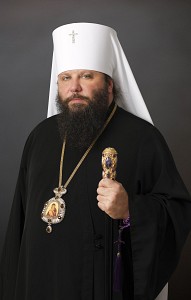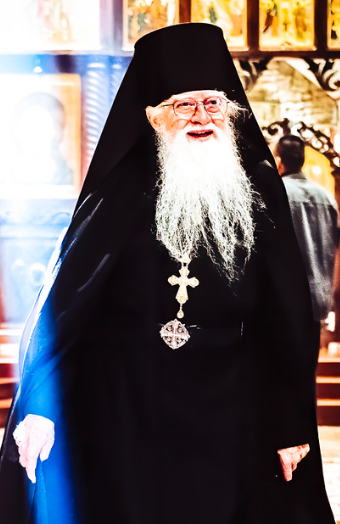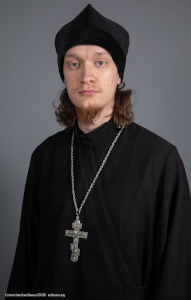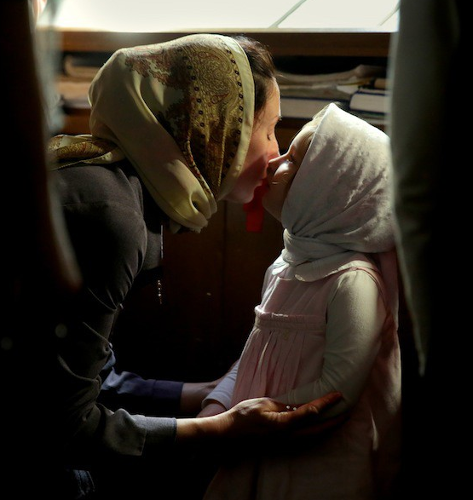



We are a small mission of the Orthodox Church located in Cullman, Alabama, under the omophorion of His Eminence, Metropolitan Nicholas, First Hierarch of the Russian Orthodox Church Outside of Russia. We have services every Saturday and Sunday, Saturday Vigil starting at 5 PM, and Sunday with The Hours starting at 9:40AM followed by Divine Liturgy at 10:00 AM..
All services are in English, and we welcome all visitors to worship with us and experience the fullness of the ancient Christian faith that was established by Christ and His Apostles. Whether you are just curious about our faith, or whether you feel your "Heart burning within you," about the Orthodox Church, all are welcome to "Come and see!" If you have any questions, please feel free to reach us at info@cullmanorthodox.com.
Our parish is primarily composed of former-Protestant converts to the Orthodoxy who have all been joined into the Body of Christ through our "One Lord, one faith, one baptism; one God and Father of all." In our journey towards Christ, we rediscovered the ancient Church, the Orthodox Church, and we are now inviting all to join us in the one true faith, the Orthodox Christian faith.
The Orthodox Christian Church is thus not Protestant, nor is it Roman Catholic, but it is the same ancient Church that the Scriptures describe to us, that the apostles died for, whom the "Gates of Hell shall not prevail against," as Christ our God promised to us. It is the Church that has preserved the sacred theology, worship, prayer life, and God-blessed traditions of ancient Christianity for two thousand years.
St. Elizabeth the New Martyr (February 24, 1864 - July 18, 1918) was born in Hesse-Darmstadt, a German province, into the grand ducal family of Hesse and by Rhine. She was the maternal granddaughter of Queen Victoria of England and the elder sister of Tsaritsa-Martyr Alexandra, the wife of Tsar-Martyr Nicholas II. Her family was composed of pious Lutherans and, despite being a princess, she lived a very austere life. She was not unfamiliar with suffering and death even from a young age: her younger brother died when she was only eight, and her mother and youngest sister died when she was only fourteen.
She was later betrothed to Grand Duke Sergei Alexandrovich Romanov of Russia, who was the fifth son of the Russian Emperor, Tsar Alexander II, the brother of Tsar Alexander III, and the uncle of Tsar-Martyr Nicholas II. They both loved each other very much, but their genuine devotion to their respective faiths, she to Lutheranism and he to Orthodoxy, was a source of sadness between them, as they wished to be unified in prayer and worship more than anything else. After much prayer and patience on the part of both husband and wife, she finally decided to convert of her own will and was baptized into the Orthodox Church on Lazarus Saturday, 1891. Her devotion to Christ, which was already strong before her conversion, was fanned into an unquenchable, flaming desire to deepen her relationship with God.
After the assassination of her husband by a violent Socialist revolutionary in 1905, Grand Duchess Elizabeth resolved to become a nun, giving away all her worldly possessions in exchange for heavenly riches. With the proceeds of the sale, she established a women's monastery, the Marfo-Mariinsky (Martha and Mary) Convent, in Moscow. It was a unique convent dedicated to charity and love through caring for others, operating on the basis of serving people like St. Martha while still maintaining contemplation and worship of God like St. Mary. For many years, she and the sisters of the convent helped the poor through providing them food, instructing adults and children free of charge, saving orphans from the slums, and tending to wounded Russian soldiers and German POWs during the height of World War One.
Her service continued even through the bloody street battles of the communist revolution, when the cacophony of cannons, rifles, and machine guns echoed throughout Moscow. Despite the fact that her selflessness and love warmed the hearts of even the most bloodthirsty revolutionaries, the newly formed Soviet government exiled her and her faithful novice, St. Barbara, first to the city of Yekaterinburg, and finally to Alapaevsk. There, she and St. Barbara were tossed down a mine shaft along with fellow prisoners Grand Duke Sergei Mikhailovich, his private secretary Fyodor Remez, Prince Vladimir Paley, and the brothers Prince Igor, Prince Konstantin, and Prince John Konstantinovich.
Her executors leaned over the mine shaft to hear the wounded St. Elizabeth consoling those who had not yet died, and leading them in hymns to God. To silence the survivors (as well as their consciences), they tossed grenades into the shaft until all went silent. St. Elizabeth and those with her were martyred on July 18th, 1918. The relics of Ss. Elizabeth and Barbara were eventually taken to Jerusalem, where they now remain interred in the famous Church of St. Mary Magdalene on the western slope of the Mount of Olives, just a few minutes walk from the Garden of Gethsemane.
In 1981, St. Elizabeth was canonized by the Russian Orthodox Church Abroad, and her fame has only increased since then. The tender, compassionate voice that was silenced on that fateful day has "gone out into all the earth, even to the ends of the world," and continues to offer help through intercessions to God on behalf of us all.
St. Elizabeth Orthodox Mission is located on a 40 acre solar / off-grid homestead, for which GPS does not work correctly. Please contact us at info@cullmanorthodox.com for directions.


Dean of Georgia, Alabama & Mississippi. Rector of St. Mary of Egypt Church in Roswell (Atlanta), GA.

Fr. Theodore Foley, Parish Rector
fr.theodore@cullmanorthodox.com
(404) 574-0612
Email: info@cullmanorthodox.com
Email: fr.theodore@cullmanorthodox.com
Phone: (404) 574-0612
& what to expect on your visit.
The original Christian Church, founded by our Lord Jesus Christ, was well established in the first centuries. All of its five major centers, Constantinople, Antioch, Jerusalem, Alexandria, and Rome, each had its own Patriarch, or first bishop among equals. These churches, referred to as a Pentarchy, from the Greek penta - 5, archia - rule, thus the Rule of 5, were united for more than 1,000 years. From Ethiopia to Ireland, as far as parts of India, the Church was united under one God, one Faith, one Holy Spirit, one theology, one Church!
In 1054, the Great Schism divided Rome from the other four Patriarchates mentioned above. (Time line). The other four major centers began to be called the Orthodox, meaning "right-worship," Christians, while Rome doubled down on its supremacy by calling itself the Roman Catholic Church, Catholic meaning "universal," thus claiming that only through the rulership of the Roman Papacy was the Universal Church to be found. It's interesting to note, however, that out of love for their fellow man and patience in Christ the other four Patriachates still maintained some ties to the Roman Church, speaking the truth in love by chiding them for their heresies of the filioque, believing that the Holy Spirit comes both from the Father and the Son, Papal supremacy, which is the claim that the Pope is the head pontiff without equals, and various other liturgical abuses still found today in the Roman church.
This changed in 1204, when Roman Catholic mercenaries, knights, and even armed monks and priests, stormed the city of Constantinople, stealing vast amounts of wealth, killing Orthodox priests and layman, and not even sparing women and nuns from defilement. After this, the Orthodox Churches woke up to the spiritual delusion that the Papacy was under and officially cut themselves off.
Many changes took place in the west that eventually brought about another division, the Protestant movement, which originated in the 1500s in the fractured princedoms of the Holy Roman Empire, in what is now modern day Germany. Sadly, in the West, so many things about Christianity have been changed and lost, with no sign on the horizon of a return to the Truth that Christ preached, which only the Orthodox Church has today.
Meanwhile, throughout these tumultuous periods of religious change and upheaval in the West, the rest of the Christian world, the Orthodox Church, has remained steadfast in its traditional beliefs in the face of invasion by Muslims, persecutions by non-Orthodox Christians, and even in the grip of the satanic powers of communist revolutionaries. We still venerate the saints and their icons, receive the Holy Body and Blood of Christ at the ancient Liturgy, confess our sins to our confessor priests, and try to live every day in a state of repentance, awaiting the time when we will inevitably meet our Lord Jesus Christ, fearful of our seemingly unending sins, yet hoping in His boundless mercy.
As it's not possible to explain nearly 2,000 years of the Orthodox Church and her history in just a few paragraphs, please feel free to contact us @ info@cullmanorthodox.com
America has only recently begun to lose its grip on its traditionally Christian roots. While many like to say that many of the founding fathers were agnostic, perhaps even part of anti-Christian organizations such as the Mason's lodge, it is without a doubt that the vast majority of America was Christian.
At the same time, the Orthodox Church came to North America first in the late 18th century through what was then Russian owned Alaska (the first American converts to Orthodoxy were native Alaskans). While the missionary efforts of St. Herman of Alaska and St. Innocent of Moscow were by no means small endeavors, the European colonists would not have the chance to encounter Orthodoxy until around the late 19th, early 20th century, when mass influxes of immigrants from Europe arrived for better work opportunities, including from many Orthodox countries. There are records of American Christians converting to the Orthodox Church in these times, but they are nothing close to what we see today.
Why is that? It's hard to say, but one can theorize that with the steady decline of Christiniaty in America, that is the traditional Protestant and Catholic denominations, a thirst for the truth, the fullness of the truth, arose. We are living in a world that cares for nothing else other than comforts, for pleasure, for self-love and hatred of fellow man, and unfortunately the other Christian organizations in America, as with the rest of the world, proved unable even by their best efforts to stop their "traditional" belief systems from being modified into something more pleasing to modern man and his fickle ways.
During all this time, the fledgling Church in America has deepened its roots, it has stood in the face of the materialistic philosophy of our society that pampers the body but oppresses the soul, and continues to stand, victoriously. This is just a theory of the rector's to answer this question, but perhaps the most correct answer is also the most simplest: we have not heard of God's true Church until now, because only now are we ready for it, only now has He opened our hearts and our minds to see the futility of this world. The doors of salvation are opening to the American people. Thank God!
No, while the Orthodox Church always respected the Roman See as "first among equals," and in fact we venerate many pre-schism Popes as Saints, like Pope St. Leo the Great, and Pope St. Gregory the Great. The Orthodox Church does not interpret Matthew 16:18, "And I say also unto thee, that thou art Peter, and upon this rock I will build My church; and the gates of hell shall not prevail against it," the same as the Romans do. The 'rock' we interpret here is the faith that Simon Peter had when he declared, "You are the Messiah, the Son of the living God," and not Peter "Cephas, the Rock," himself.
This is further proved by the events of the Council in Jerusalem, which occurred in the year 48 A.D. and is recorded in the Acts of the Apostles. This council was addressed over the issue of whether Gentile converts to Christianity should be circumcised. This council was headed not by Peter, 1st bishop of Rome, but by James, the first bishop of Jerusalem. Why? Because the council occurred on his canonical territory, Jerusalem. It is clear that the Apostle St. James, the Brother of the Lord not by Blood, spoke authoritatively at this council, concluding it with the exhortation that the Gentiles not be circumcised, and that the elders and bishops of the council instead exhort them not to eat things offered to by idols and from sexual immorality.
There are various other 'proofs' for the illegitimacy of the Papacy's claim to supremacy, but it is enough to say that the Orthodox Church has Christ as their head pontiff, keeping in mind the words of that great 6th century Pope St. Gregory, “Whosoever calls himself, or desires to be called, Universal Priest, is in his elation the precursor of antichrist.” How, then, does the Orthodox Church ever accomplish anything, one might ask?
We must remember that the Orthodox Church does not need to go through constant changes to "keep up" with society as other Christian organizations do, but that all of the Patriarchs and heads of other smaller autocephalous churches such as Cyprus, Greece, and so on, meet in occasions to defend the faith and uphold the truth. These councils are called Ecumenical Councils, where the entire Church meets to pray that the Holy Spirit guide them to the preservation of the faith, rather than to the modification of it as we have seen with the post-schism councils of the Romans.
One should also keep in mind that Patriarchs are simply bishops who are in a higher position of administrative authority, they cannot perform any special sacraments that other bishops "below" them cannot already do. They are the necessary administrative component of the Church on Earth, which is comprised of sinners struggling for repentance, and thus needs human organizations to be run efficiently, so long as these organizations are ran with the help of the Holy Spirit.
There are a few things that differentiate the Orthodox worship service from the other Christian sects.
Firstly is the length, there are few services that are shorter than an hour. This is not done because we value the length of prayers like Pharisees, but because the content of the prayers that must be said are quite long in of themselves, and that it often takes a bit of time to get the heart into the right 'mood' for prayer. Coming into an Orthodox church, whether you're a zealous baptized Orthodox Christian or a curious visitor off the street, it sometimes takes time to immerse yourself in the services due to the very distracted lives we live today. We pray to God for mercy, for repentance, we glorify Him, we thank Him, we praise Him, and we ask for His mercy to be found on all of our friends, enemies, and every single human soul in His creation which we have destroyed through our sins and selfishness.
Secondly is the aesthetic qualities of the Church. Candles, incense, and an Old Testament-derived desire to beautify our churches. We have icons both of saints and of Christ, which we venerate, kissing them with love and asking for their help. To the icons of the saints we kiss them and ask for their help to live the lives they lived, which were pleasing to God, "the prayer of a holy man availeth much," James 5:16, and since they still live and can hear our prayers through God's mercy, "But concerning the dead, that they rise, have you not read in the book of Moses, in the burning bush passage, how God spoke to him, saying, ‘I am the God of Abraham, the God of Isaac, and the God of Jacob’? He is not the God of the dead, but the God of the living." Mark 12:26-27. When we kiss the icons of Christ or icons that represent the Holy Trinity (as the Holy Trinity is bodiless and cannot be imaged except through representations, such as the Three Angels that visited Abraham), we worship him and ask Him for mercy and for help in our various struggles. Thus, we ask our fellow humans who have found God's mercy for their prayers, and we worship God and ask Him for mercy as well.
Thirdly, the singing. No musical instruments are allowed in an Orthodox Church, only the voice, which has the God-given properties to pluck at a man's soul. God, in His wisdom, knew that if the Church was externally dull, if her various dogmas and soul-saving instructions were proclaimed like a teacher reading from a textbook, then man would not be moved. Thus, some of the most soul saving instructions in the Church are sung. One only needs to look up "Orthodox Church singing," and even if they can't understand the language, they can feel the words. Some examples of Church singing: "My soul, my soul, arise! Why are you sleeping?" sung in the First week of Lent, Rejoice O Bethany, sung also during Lent, on the feast of the Raising of Lazarus, or the famous rendition of Psalm 50 sang by Aramaic chanters, all of which can be found on YouTube.
There are various other beautiful practices in our churches, of which one can only experience when he visits a church for services. Come and see!

|